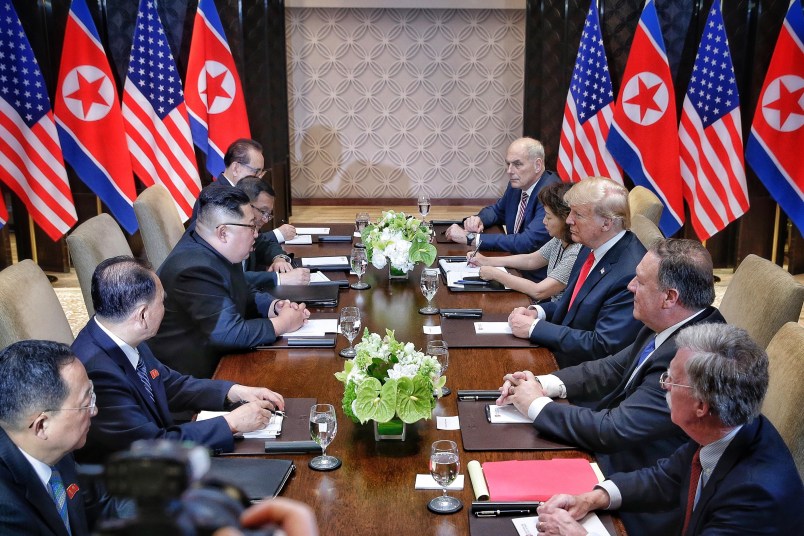The verdict is in: Meh.
That’s generally how foreign affairs experts reacted to the historic summit between President Trump and North Korean leader Kim Jong Un in Singapore. For the most part, experts agreed that Trump made more significant concessions than Kim; that North Korea has committed to denuclearization before and not followed through; and that even a weak agreement is better than war.
Here is a roundup of some of their reactions:
First is the deja vu camp. These experts have seen these pacts before, and despite all the pageantry from the Trump administration about the historic nature of this sit-down, they don’t see anything new here. What’s more, some of them see this agreement as even weaker than other administrations’ — particularly due to the ambiguity around the denuclearization logistics.
1) Heritage Senior Research Fellow for Northeast Asia Bruce Klinger, who served as CIA deputy division chief for Korea, on Twitter:
This is very disappointing. Each of the four main points was in previous documents with NK, some in a stronger, more encompassing way. The denuke bullet is weaker than the Six Party Talks language. And no mention of CVID, verification, human rights.
— Bruce Klingner (@BruceKlingner) June 12, 2018
2) Former Deputy National Security Advisor for Strategic Communications Ben Rhodes on Twitter:
North Korea has repeatedly committed to denuclearization over the years. They have never followed through, and we won’t know if they will without an intrusive international inspections regime (like the one in the Iran Deal that Trump called a catastrophe)
— Ben Rhodes (@brhodes) June 12, 2018
3) James Acton, senior associate of the Nuclear Policy Program at the Carnegie Endowment for International Peace, on Twitter:
<Thread>Diplomacy with North Korea has reduced the risk of war. But the summit—and particularly its immediate aftermath—was a farce, and the respite is only likely to be temporary. (1/14)
— (((James Acton))) (@james_acton32) June 12, 2018
The denuclearization language is meaninglessly weak for 3 reasons:
1. “Towards”
2. For DPRK, “denuclearization of Korean Peninsula” ≠ unilateral disarmament.
3. By reaffirming Panmunjom declaration, US effectively conceded that Korean denuclearization part of global disarmament. pic.twitter.com/g6UvuBy75P— (((James Acton))) (@james_acton32) June 12, 2018
4) New York Times National Security correspondent David Sanger to CNN’s Poppy Harlow: “The words complete denuclearization are there, but they’re nowhere defined and there’s no timetable,” he said. “Previous agreements have committed North Korea to allowing [International Atomic Energy Agency] inspectors back into the country, to adhering to international arms control treaties, and so forth.”
5) Vipin Narang, MIT associate professor specializing in nuclear proliferation in North Korea, on Twitter:
There it is: a vague meaningless pledge in exchange for a vague meaningless guarantee. pic.twitter.com/LpWojKzCM8
— Vipin Narang (@NarangVipin) June 12, 2018
6) Josh Smith, the Reuters senior correspondent covering the Koreas, on Twitter:
This agreement does not seem likely to change many minds. Pessimists will see it as toothless and nothing new; optimists will see it as just the beginning, the best that could be expected, and talking better than war. https://t.co/TUJmsYX3m1
— Josh Smith (@joshjonsmith) June 12, 2018
The other group homes in on Trump’s concessions, noting that his agreement to cease United States-South Korea military exercises is a big win for Kim, and was made without getting the United States anything significant in return.
7) General Michael Hayden, former CIA director, to CNN’s John Berman: “The North Koreans did not come with anything new,” he said. “The new element is that we agreed to stop our annual exercise cycle with our South Korean allies. That’s actually a pretty significant concession.”
8) Ian Bremmer, president of the Eurasia Group, on CBS:
“What we have is a freeze for freeze. The North Koreans are freezing their ICBM & nuclear tests & the Americans are freezing our military exercises with the S. Koreans. That’s exactly the formation the Chinese asked for over the past year & we said absolutely not.” — @ianbremmer pic.twitter.com/uvox2OHk2s
— CBS This Morning (@CBSThisMorning) June 12, 2018
9) Julian Borger, The Guardian’s world affairs editor, on Twitter:
Trump says the US will stop joint military exercises with South Korea, saying it will save “a tremendous amount of money” and noting the war games are “very provocative”
A huge concession— Julian Borger (@julianborger) June 12, 2018







